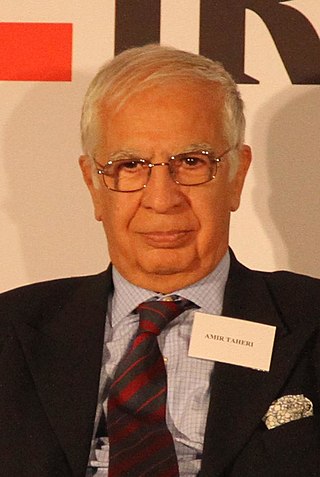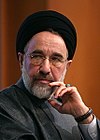
The Islamic Supreme Council of Iraq is a Shia Islamist political party in Iraq. It was established in Iran in 1982 by Mohammed Baqir al-Hakim and changed its name to the current Islamic Supreme Council of Iraq in 2007. Its political support comes from Iraq's Shia Muslim community.

Mohammad Khatami is an Iranian reformist politician who served as the fifth president of Iran from 3 August 1997 to 3 August 2005. He also served as Iran's Minister of Culture from 1982 to 1992. Later, he was critical of the government of subsequent President Mahmoud Ahmadinejad.

The Guardian Council is an appointed and constitutionally mandated 12-member council that wields considerable power and influence in the Islamic Republic of Iran.

The Islamic Dawa Party, also known as the Islamic Call Party, is a Shia Islamist political party in Iraq. Dawa and the Supreme Islamic Iraqi Council are two of the main parties in the religious-Shiite United Iraqi Alliance, which won a plurality of seats in both the provisional January 2005 Iraqi election and the longer-term December 2005 election. The party is led by Haider al-Abadi, who was the Prime Minister of Iraq from 8 September 2014 to 25 October 2018. The party backed the Iranian Revolution and also Ayatollah Ruhollah Khomeini during the Iran–Iraq War and the group still receives financial support from Tehran despite ideological differences with the Islamic Republic. As of 2019, after two decades of political prominence and success, it is suffering from internal divisions and is in danger of losing its "political relevance".

Seyyed Ali Hosseini Khamenei is an Iranian Twelver Shia marja' and politician who has served as the second supreme leader of Iran since 1989. He previously served as third president of Iran from 1981 to 1989. Khamenei is the longest-serving head of state in the Middle East, as well as the second-longest-serving Iranian leader of the last century, after Shah Mohammad Reza Pahlavi.

Ali Akbar Hashimi Bahramani Rafsanjani was an Iranian politician and writer who served as the fourth president of Iran from 1989 to 1997. One of the founding fathers of the Islamic Republic, Rafsanjani was the head of the Assembly of Experts from 2007 until 2011 when he decided not to nominate himself for the post. He was also the chairman of the Expediency Discernment Council.

Mohamed Salah al-Din al-Halim Zaidan commonly known by his nom de guerreSaif al-Adel is a former Egyptian Army officer and explosives expert who is widely understood to be the de facto leader of al-Qaeda. Al-Adel fought the Soviets as an Afghan Arab before becoming a founding member of the al-Qaeda organization. He is a member of Al-Qaeda's Majlis al-Shura and has headed the organization's military committee since the death of Muhammad Atef in 2001. He is currently known to live in Iran along with several other senior members of the group.

The Assembly of Experts, also translated as the Assembly of Experts of the Leadership or as the Council of Experts, is the deliberative body empowered to appoint the Supreme Leader of Iran. All directly elected members must first be vetted by the Guardian Council.

Presidential elections were held in Iran 17 June 2005, with a second round run-off on 24 June. Mohammad Khatami, the outgoing president of Iran, stepped down on 2 August 2005, after serving his maximum two consecutive four-year terms according to the Islamic republic's constitution.

Amir Taheri is an Iranian-born journalist, author, intellectual, scholar of Middle Eastern politics and activist based in Europe. His writings focus on the Middle East affairs and topics related to Islamic terrorism. He is the current Chairman of Gatestone Institute in Europe.

Ali Akbar Velayati is an Iranian conservative politician and physician. He is currently a member of the Expediency Discernment Council. Velayati is a distinguished professor at Shahid Beheshti University of Medical Sciences, senior adviser to the Supreme Leader in international affairs and head of the board of founders and the board of trustees of the Islamic Azad University.

The Mehr News Agency is a semi-official news agency of the government of Iran. It is headquartered in Tehran, and is owned by the Iranian government's Islamic Development Organization (IIDO).

The Law Enforcement Command of the Islamic Republic of Iran, previously known as the Law Enforcement Force of the Islamic Republic of Iran or Disciplinary Force of the Islamic Republic of Iran, abbreviated as Faraja, is the uniformed police force in Iran. The force was created in early 1992 by merging the Shahrbani, Gendarmerie, and Islamic Revolutionary Committees into a single force. It has more than 260,000 police personnel, including border guard personnel, and is under the direct control of the Supreme Leader Ali Khamenei who is the head of state and Commander-in-Chief of the Armed Forces. In 2003, some 40000 women became the first female members of the police force since the 1979 Iranian Revolution. The Guidance Patrol, commonly called the "morality police", was a vice squad/Islamic religious police in the Law Enforcement Force of the Islamic Republic of Iran, established in 2005 with the task of arresting people who violate the Islamic dress code, usually concerning the wearing by women of hijabs covering their hair.
During the Iran–Iraq War, both Iran and Iraq received large quantities of weapons.

The Iranian diaspora refers to Iranian citizens or people of Iranian descent living outside Iran.

Following the Iranian Revolution, Iran's banking system was transformed to be run on an Islamic interest-free basis. As of 2010 there were seven large government-run commercial banks. As of March 2014, Iran's banking assets made up over a third of the estimated total of Islamic banking assets globally. They totaled 17,344 trillion rials, or US$523 billion at the free market exchange rate, using central bank data, according to Reuters.

Iran is a member of the WIPO since 2001 and has acceded to several WIPO intellectual property treaties. Iran joined the Convention for the Protection of Industrial Property in 1959. In December 2003 Iran became a party to the Madrid Agreement and the Madrid Protocol for the International Registration of Marks. In 2005 Iran joined the Lisbon Agreement for the Protection of Appellations of Origin and their International Registration, which ensures the protection of geographical names associated with products. As at February 2008 Iran had yet to accede to The Hague Agreement for the Protection of Industrial Designs.

The supreme leader of Iran ), also referred to as Supreme Leader of the Islamic Revolution, but officially called the Supreme Leadership Authority, is the head of state and the highest political and religious authority of the Islamic Republic of Iran. The armed forces, judiciary, state television, and other key government organizations such as the Guardian Council and Expediency Discernment Council are subject to the Supreme Leader. According to the constitution, the Supreme Leader delineates the general policies of the Islamic Republic, supervising the legislature, the judiciary, and the executive branches. The current lifetime officeholder, Seyyed Ali Hosseini Khameneh known as Ali Khamenei, has issued decrees and made the final decisions on the economy, the environment, foreign policy, education, national planning, and other aspects of governance in Iran. Khamenei also makes the final decisions on the amount of transparency in elections, and has dismissed and reinstated presidential cabinet appointees. The Supreme Leader is legally considered "inviolable", with Iranians being routinely punished for questioning or insulting him.

Dari Lu is a village in Minjavan-e Sharqi Rural District, Minjavan District, Khoda Afarin County, East Azerbaijan Province, Iran. At the 2006 census, its population was 429, in 84 families. According to a more recent reliable statistics the population is 399 people in 102 families, which indicates a significant increase in the number of households while population is declining.

The Government of the Islamic Republic of Iran, known simply as Nezam, is the ruling state and current political system in Iran, in power since the Iranian Revolution and fall of the Pahlavi dynasty in 1979.


















